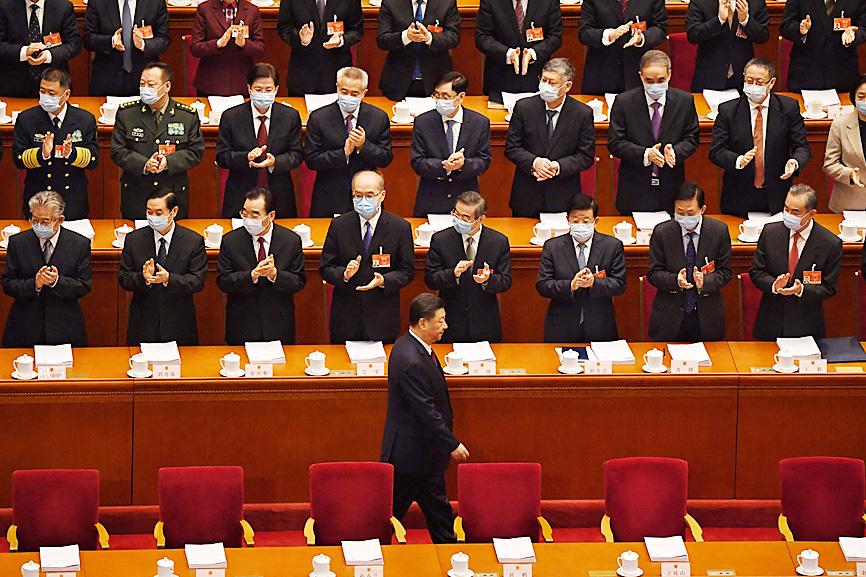China yesterday projected defense spending growth of 6.8 percent this year, while saying that it would deter any “separatist activity” from Taiwan, but remain committed to promoting cross-strait relations.
Beijing has increased its military activity near Taiwan in the past few months, responding to what it calls “collusion” between Taipei and Washington, the nation’s main international backer and arms supplier.
At the opening of the annual Chinese National People’s Congress, Chinese Premier Li Keqiang (李克強) said that Beijing stands by its “one China” principle, which states that Taiwan is part of China.

Photo: AFP
China remains committed “to promoting the peaceful growth of relations across the Taiwan Strait and China’s reunification,” he told about 3,000 delegates at the Great Hall of the People in Beijing.
“We will remain highly vigilant against and resolutely deter any separatist activity seeking Taiwan independence,” Li said.
“We will promote exchanges, cooperation and integrated development across the Taiwan Strait. Together we can shape a bright future of rejuvenation for our great nation,” he added.
The Mainland Affairs Council in Taipei responded by urging China to begin “benign” interactions with it to gradually resolve disagreements through communications.
The council said the government would continue to resolutely defend its sovereignty and Taiwan’s democracy and freedom, and that healthy and orderly exchanges were better than “enforced” pressure.
Also at the conference, the Chinese Ministry of Finance said it would bolster the country’s defense spending 6.8 percent this year, the largest gain since 2019, amid tensions with the US and key neighbors.
Military expenditure is expected to climb to 1.35 trillion yuan (US$208.03 billion) in the coming year, the ministry said.
The figure compares with a projected rise of 1.8 percent in budgeted fiscal spending.
A Bloomberg calculation of the latest defense budget number shows spending for this year would actually rise 6.9 percent.
“We will provide stronger financial guarantees to vigorously support the modernization of national defense and the armed forces, and help China’s defense capabilities rise in step with its economic strength,” the ministry said in a report.
The spending boost comes after China sparred with India on its border and as the nation seeks to modernize its military to make it more competitive with the US.
“We will boost military training and preparedness across the board, make overall plans for responding to security risks in all areas and for all situations, and enhance the military’s strategic capacity to protect the sovereignty, security and development interests of our country,” Li said.
“Considering Beijing’s threat perceptions and goal of achieving military modernization by 2035, I’d expect defense spending to continue to be a priority,” said Meia Nouwens, a senior fellow at the International Institute for Strategic Studies.

SECURITY: As China is ‘reshaping’ Hong Kong’s population, Taiwan must raise the eligibility threshold for applications from Hong Kongers, Chiu Chui-cheng said When Hong Kong and Macau citizens apply for residency in Taiwan, it would be under a new category that includes a “national security observation period,” Mainland Affairs Council (MAC) Minister Chiu Chui-cheng (邱垂正) said yesterday. President William Lai (賴清德) on March 13 announced 17 strategies to counter China’s aggression toward Taiwan, including incorporating national security considerations into the review process for residency applications from Hong Kong and Macau citizens. The situation in Hong Kong is constantly changing, Chiu said to media yesterday on the sidelines of the Taipei Technology Run hosted by the Taipei Neihu Technology Park Development Association. With

A US Marine Corps regiment equipped with Naval Strike Missiles (NSM) is set to participate in the upcoming Balikatan 25 exercise in the Luzon Strait, marking the system’s first-ever deployment in the Philippines. US and Philippine officials have separately confirmed that the Navy Marine Expeditionary Ship Interdiction System (NMESIS) — the mobile launch platform for the Naval Strike Missile — would take part in the joint exercise. The missiles are being deployed to “a strategic first island chain chokepoint” in the waters between Taiwan proper and the Philippines, US-based Naval News reported. “The Luzon Strait and Bashi Channel represent a critical access

‘FORM OF PROTEST’: The German Institute Taipei said it was ‘shocked’ to see Nazi symbolism used in connection with political aims as it condemned the incident Sung Chien-liang (宋建樑), who led efforts to recall Democratic Progressive Party (DPP) Legislator Lee Kun-cheng (李坤城), was released on bail of NT$80,000 yesterday amid an outcry over a Nazi armband he wore to questioning the night before. Sung arrived at the New Taipei City District Prosecutors’ Office for questioning in a recall petition forgery case on Tuesday night wearing a red armband bearing a swastika, carrying a copy of Adolf Hitler’s Mein Kampf and giving a Nazi salute. Sung left the building at 1:15am without the armband and apparently covering the book with a coat. This is a serious international scandal and Chinese

COUNTERINTELLIGENCE TRAINING: The ministry said 87.5 percent of the apprehended Chinese agents were reported by service members they tried to lure into becoming spies Taiwanese organized crime, illegal money lenders, temples and civic groups are complicit in Beijing’s infiltration of the armed forces, the Ministry of National Defense (MND) said in a report yesterday. Retired service members who had been turned to Beijing’s cause mainly relied on those channels to infiltrate the Taiwanese military, according to the report to be submitted to lawmakers ahead of tomorrow’s hearing on Chinese espionage in the military. Chinese intelligence typically used blackmail, Internet-based communications, bribery or debts to loan sharks to leverage active service personnel to do its bidding, it said. China’s main goals are to collect intelligence, and develop a